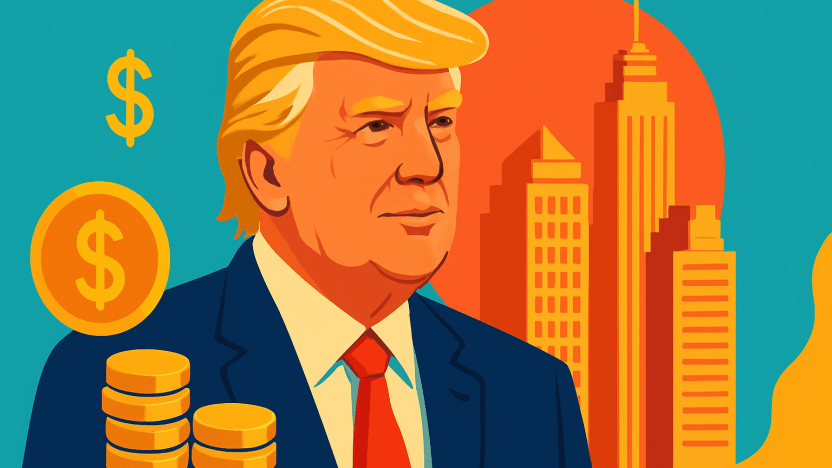Donald Trump is a name that resonates across various domains, from real estate and entertainment to politics. While his political career has often overshadowed his business endeavors, Trump’s journey as a businessman is marked by both remarkable successes and notable failures.
The Business Career of Donald Trump
Early Beginnings and Initial Ventures
Donald Trump’s business career began while he was still in college. After graduating from the Wharton School of the University of Pennsylvania in 1968, he joined his father’s real estate company, E. Trump & Son. His early work involved managing rental properties in Brooklyn and Queens, which laid the foundation for his later ventures.
In 1976, Trump made a significant move by acquiring the Commodore Hotel in Manhattan, which he transformed into the Grand Hyatt Hotel. This deal was notable for its innovative financing arrangement that included a 40-year tax abatement from the city of New York, allowing Trump to save approximately $400 million over four decades. This project showcased Trump’s ability to negotiate complex deals and leverage political connections to benefit his business interests.
Expansion into Real Estate and Casinos
The 1980s marked a period of aggressive expansion for Trump. He developed several high-profile properties in New York City, including:
- Trump Tower: Opened in 1983, this iconic skyscraper became a symbol of luxury and success.
- Trump Plaza: Completed in 1984, this residential cooperative further solidified his reputation in Manhattan real estate.
- Trump Taj Mahal: Opened in 1990, it was the largest casino in the world at that time but faced financial difficulties shortly after its launch.

Trump’s ventures into the casino industry were ambitious but fraught with challenges. Despite initial success, many of his casinos struggled financially. The Taj Mahal filed for bankruptcy just a year after opening due to overwhelming debt incurred during its construction. Over the years, Trump’s casino businesses filed for bankruptcy multiple times, leading to significant financial restructuring efforts.
Branding and Licensing
One of Trump’s most significant achievements as a businessman has been his ability to market his name as a brand. He ventured into various industries beyond real estate, including:
- Trump University: An online education platform focused on real estate investment that ultimately faced legal challenges and was dissolved after allegations of fraud.
- Trump Merchandise: His name has been licensed for various products ranging from clothing to home goods.
- Golf Courses and Resorts: Trump owns several golf courses and resorts worldwide, further expanding his brand’s reach.
The branding strategy allowed Trump to maintain a high-profile presence even when some of his core businesses were struggling financially. His name became synonymous with luxury and success, which he leveraged to enter new markets.
Business Philosophy of Donald Trump and his Negotiation Style
Trump’s approach to business is characterized by a philosophy he describes as “win-win-win,” which emphasizes that all parties involved should benefit from negotiations. This principle has guided many of his deals and partnerships throughout his career. He believes that fostering goodwill can lead to long-term relationships beneficial for future endeavors.
His negotiation tactics often blend assertiveness with charm, creating a sense of urgency that can be advantageous in closing deals. This approach has been evident in various projects, including the renovation of Wollman Rink in Central Park, completed under budget and ahead of schedule.
Failures and Controversies
Despite numerous successes, Trump’s business career has also been marred by failures and controversies. Some notable missteps include:
- Trump Airlines: Acquired for $365 million but never turned a profit.
- Trump Vodka: Launched with high expectations but failed to gain market traction.
- Trump University: Faced multiple lawsuits resulting in a $25 million settlement for fraud allegations.
These ventures illustrate the risks associated with Trump’s aggressive business strategies and highlight the challenges he faced in maintaining profitability across diverse industries.
What Made Donald Trump Join Politics
Donald Trump’s entry into politics was influenced by a combination of personal ambition and a desire for greater visibility. Initially, Trump had expressed skepticism about the political arena, describing it as “a very mean life” and suggesting that capable individuals typically gravitate toward business.
However, by the late 1980s, he began to toy with the idea of running for president, using public appearances and media to gauge interest. His political aspirations crystallized in 2015 when he announced his candidacy for the 2016 election, positioning himself as a populist outsider who could “Make America Great Again.”
Trump’s motivations were not solely rooted in policy or public service; he candidly admitted that running for president significantly increased his fame and marketability. In interviews, he revealed that one of the primary reasons he pursued the presidency was to elevate his public profile, stating that many wealthy individuals remained unknown while he sought to be a household name.
This self-centered approach to politics marked a departure from traditional motivations seen in many political candidates and underscored his unique brand of leadership that blended celebrity with governance.
Donal Trump’s initial public statements about running for president
Donald Trump’s initial public statements about running for president began as early as the 1980s when he expressed skepticism about political life, describing it as “a very mean life” and suggesting that capable individuals typically choose business over politics.
By 1987, he took out full-page newspaper ads advocating for U.S. foreign policy changes and hinted at a presidential run, claiming, “I believe that if I did run for President, I’d win”. His serious entry into the race came on June 16, 2015, when he announced his candidacy with a speech at Trump Tower, focusing on issues like illegal immigration and job offshoring, while declaring his intent to “Make America Great Again” .
Conclusion
Donald Trump’s business career is a complex tapestry of ambition, innovation, successes, and failures. His ability to navigate the tumultuous waters of real estate development and branding has left an indelible mark on American business culture. While his political career often dominates public discourse, understanding Trump’s business acumen provides valuable insights into how he built one of the most recognizable brands in the world—one that continues to influence various sectors today.



